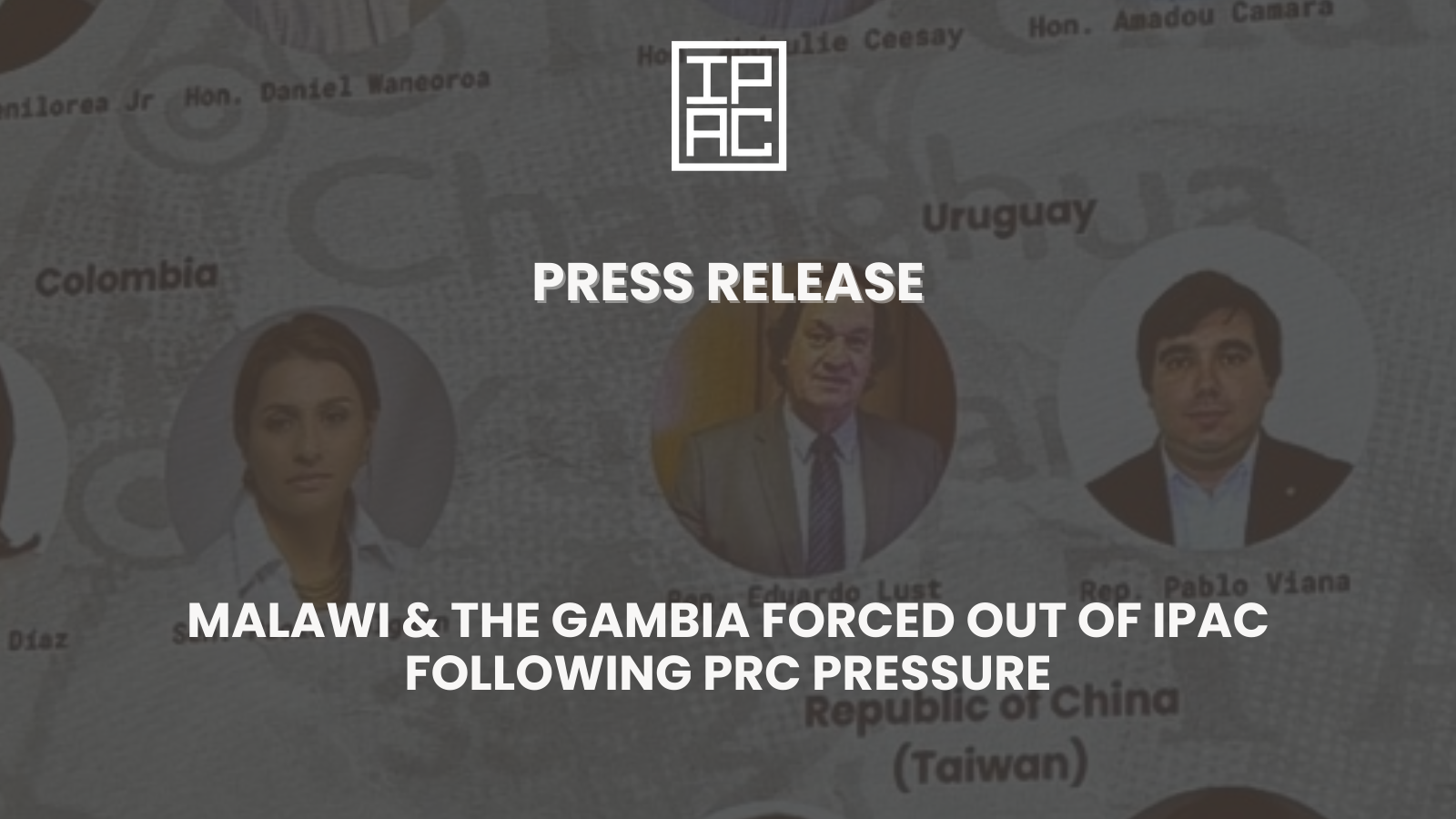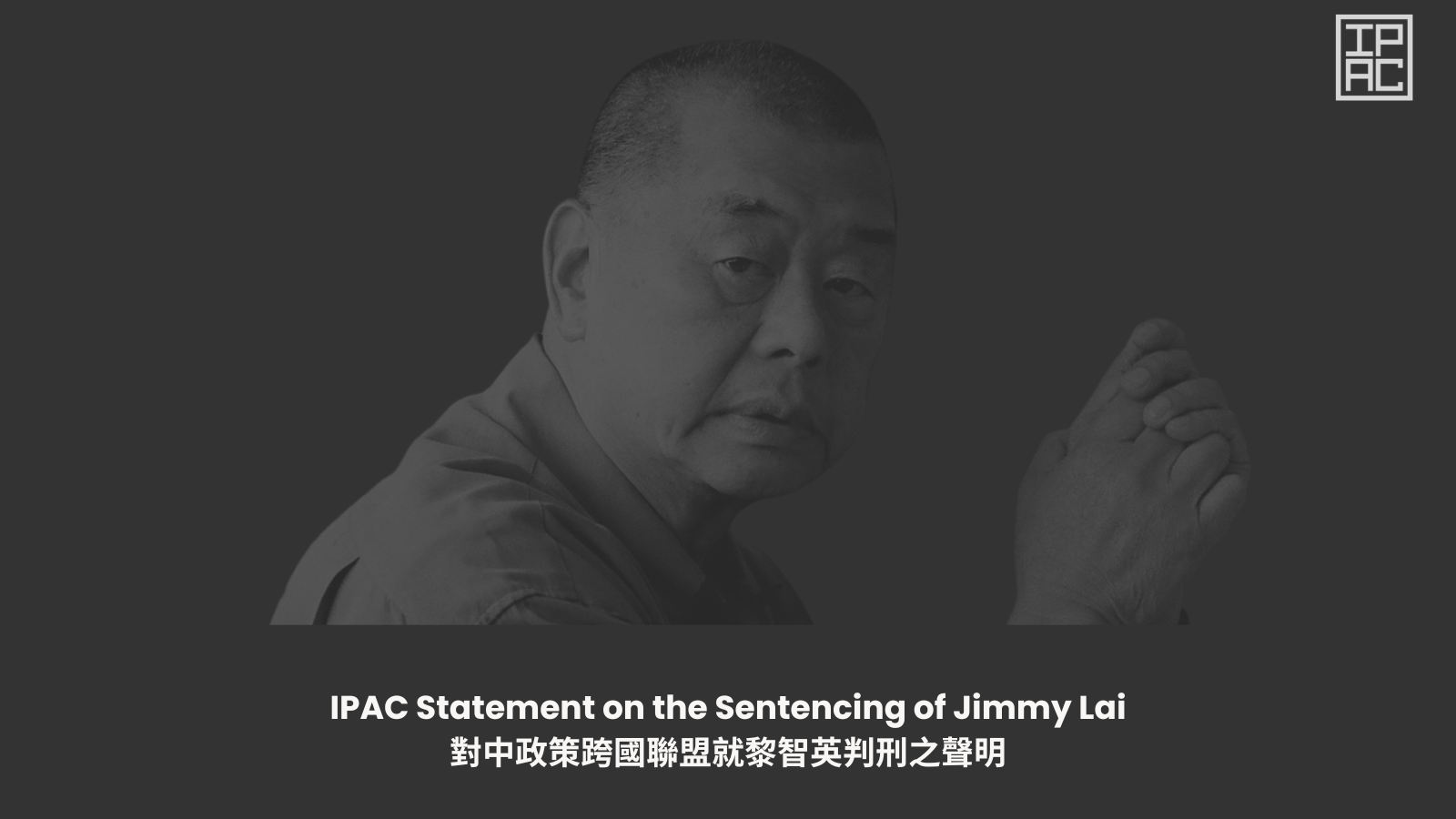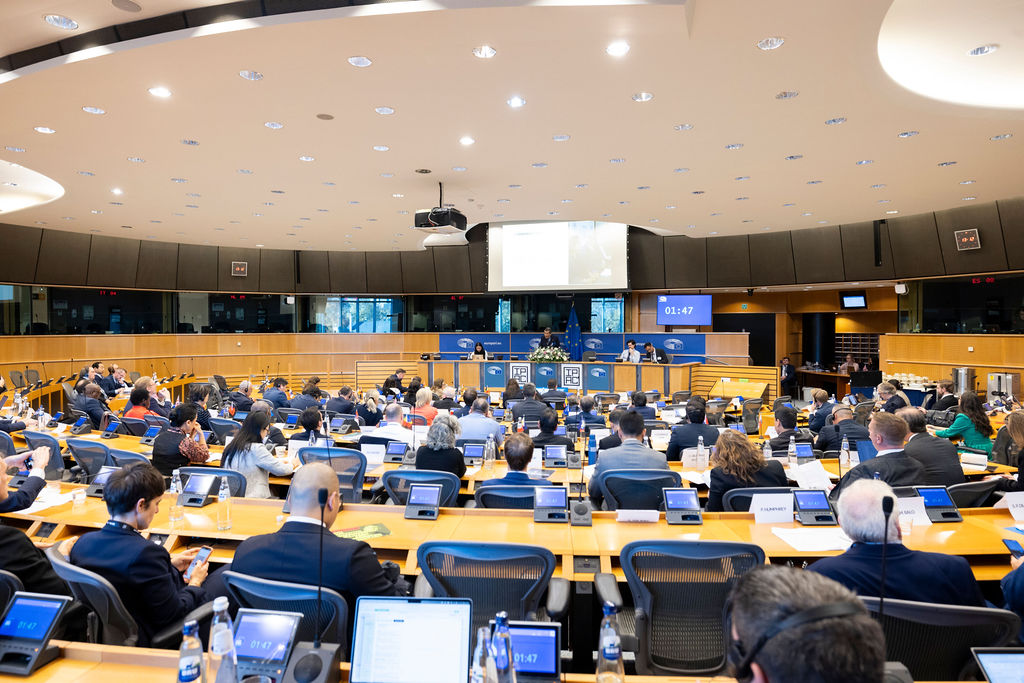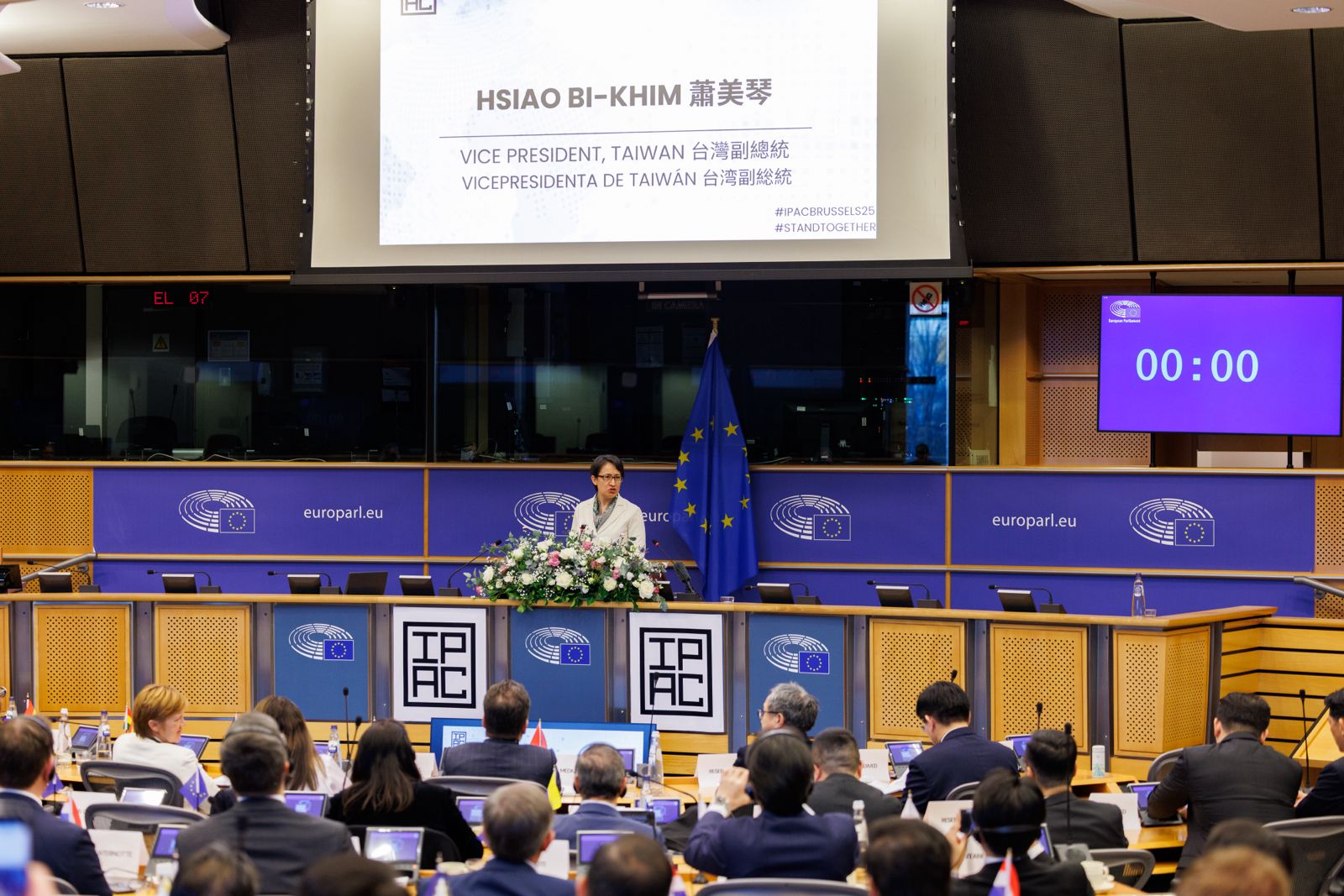Malawi and The Gambia Forced Out of IPAC Following PRC Pressure

April 9, 2025 - The Associated Press has today revealed that Co-Chairs from the Inter-Parliamentary Alliance on China (IPAC) in Malawi and The Gambia, were subjected to coercion and intimidation by the People’s Republic of China (PRC), ultimately forcing them to withdraw from the alliance.
The Co-Chairs, Ephraim Kayembe MP and Ackson Kalaile Banda from Malawi, and Abdoulie Ceesay MP and Amadou Camara from The Gambia withdrew from IPAC after heavy pressure was applied to their respective governments by PRC diplomats. The article reports that Chinese ambassadors in both countries sought urgent meetings with high level government officials to discuss the participation of these parliamentarians in IPAC.
In the case of Malawi, the PRC intimated that, should the MPs continue their involvement in IPAC, a planned presidential visit to China would be cancelled.
Pressure on both countries was applied after IPAC announced that Malawi and The Gambia has joined the alliance during IPAC’s annual summit in Taipei, July 2024. In their resignation letters, Co-Chairs from both Malawi and The Gambia iterated their support for the “One China” Principle, using language proposed by the PRC.
These actions underscore China’s increasingly aggressive tactics to coerce, intimidate and suppress democratic engagement on issues that may be perceived as being critical of the Chinese state, especially in less-developed economies where the PRC has economic leverage. The departure of Malawi and The Gambia under such coercion raises serious concerns over the extent of Chinese interference in the political autonomy of sovereign democratic nations, particularly in Africa.
The Honourable Peter Keniloria Jr., IPAC Co-Chair for The Solomon Islands said:
The intimidation and coercion witnessed by China here is nothing new, we need to call out all instances and stand firm in the face of intimidation. Our democracies will not be bullied
Senator Centa Rek Lopez Co-Chair for Bolivia said:
The Chinese government exercises authoritarian actions over less powerful countries using practices such as economic diplomacy, infrastructure investment, trade pressure, and, in some cases, political coercion. Undoubtedly, these actions undermine the sovereignty and democracy of weaker nations, creating interference that weakens their institutions and makes them fragile and dependent on external aid.
IPAC, in a joint statement, said:
"The departure of Malawi and The Gambia is a matter of regret which raises serious concerns over the extent of Chinese interference in the political autonomy of sovereign democratic nations."
Full statement below.
IPAC STATEMENT ON PRC POLITICAL COERCION IN AFRICA
We stand in solidarity with our fellow IPAC members across Africa, and in sympathy with our former Co-Chairs in Malawi and The Gambia. Beijing’s coercion and political interference has sunk to new depths, with Chinese diplomats now seeking to dictate what foreign lawmakers can and cannot do, and with whom they can associate.
The activities of foreign lawmakers are not matters for Beijing. African countries are free to determine their own affairs and should not be subjected to threats and intimidation in an effort to suppress democratic engagement on issues that may be perceived as being critical of the Party-State.
The departure of Malawi and The Gambia is a matter of regret which raises serious concerns over the extent of Chinese interference in the political autonomy of sovereign democratic nations. Lawmakers across Africa are increasingly concerned about Beijing’s activity in the continent, and must be able to exercise their legitimate democratic rights free from foreign interference.
IPAC will always remain as a place where like-minded lawmakers can come together across parties and geographies. We call upon our governments to make clear their opposition to Beijing’s interference in Malawi and The Gambia and reiterate their commitment to defending the rights of freely elected lawmakers across the world.
ENDS
Notes:
- Quotes can be reproduced citing IPAC titles of both politicians.
- IPAC remains present in Kenya, Uganda and Zimbabwe. In 2020 IPAC was founded by leading politicians from 8 democracies. Around 280 politicians from 39 parliaments now make up the alliance.
- IPAC unites politicians worldwide, promoting democracy and addressing threats to the rules-based and human rights systems posed by the rise of China. www.ipac.global
- For media enquiries, please contact: press@allianceonchina.org
中國政府向馬拉威及岡比亞施壓迫使議員退出對中政策跨國聯盟
4 月 9 日 - 《美聯社》今日報導,對中跨國政策聯盟(IPAC)的馬拉威及岡比亞聯席主席受到中國政府施壓與威脅,最終被迫退出該聯盟。
在中國外交官向馬拉威及岡比亞政府施加強大壓力後,馬拉威聯席主席 Ephraim Kayembe 議員、 Ackson Kalaile Banda 議員,岡比亞聯席主席 Abdoulie Ceesay 議員、Amadou Camara 議員相繼退出 IPAC。美聯社報導,中國駐馬拉威及岡比亞的大使曾緊急約見兩國高層官員,要求討論兩國議員參與IPAC的問題。
中國政府威脅馬拉威政府,假若該國議員繼續參與 IPAC,其總統原定的訪華行程將被取消。
IPAC 於 2024 年 7 月的台北年度峰會上宣布馬拉威及岡比亞加入聯盟後,兩國均受中國施壓。在辭職信中,兩國聯合主席均表示支持「一個中國」原則,並皆採用了中國建議的措辭。
這些舉動凸顯中國日漸強硬的手段,透過恐嚇與施壓,抑制民主國家在涉及中國議題上的自主參與,尤其針對在經濟上對中國較為依賴的欠發達國家。馬拉威及岡比亞的退出,引起公眾強烈關注對中國對非洲等主權國家政治自主性的干預。
所羅門群島聯席主席 Peter Kenilorea Jr. 議員指:
中國這種威迫手段並非新鮮事,我們必須堅決譴責這類行為,在面對威脅時保持堅定,民主國家絕不會向霸凌低頭。
玻利維亞聯席主席參議員 Centa Rek Lopez 說:
中國政府使用經濟外交、基建投資、貿易壓力、甚至政治脅迫等手段,向較弱勢的國家採取威權行動。無容置疑,這些手段可破壞較弱勢國家的主權和民主,並製造機會滲透他們的制度,使其脆弱及依賴外援。
IPAC 在聯合聲明指:
馬拉威和岡比亞的退出令人遺憾。中國對主權民主國家的干預引起高度關注。
聲明全文如下 –
對中政策跨國聯盟就中國對非洲國家政治脅迫聲明
我們與非洲國家的 IPAC 成員堅定站在同一陣線,並對巴拉威和岡比亞的前聯席主席表示慰問。北京的脅迫及政治干預變本加厲,中國外交官試圖干涉他國立法者的自主權,意圖規範他們的行動或干預其誰來往。
他國立法者的活動不由北京置喙。非洲國家應擁有自主決定本國事務的權力,並且不應因其在民主參與討論對中共而言屬批判的議題,而遭受威脅與恫嚇。
馬拉威和岡比亞的退出令人遺憾。中國對主權民主國家的干預引起高度關注。非洲各國的立法者對北京在非洲大陸日益增長的影響表示擔憂,他們應在不受干預下行使其正當的民主權利。
IPAC 將繼續作為志同道合、不論地域及黨派的立法者交流的平台。我們呼籲各國政府明確表態,反對北京對馬拉威及岡比亞的干預,並重申他們將對捍衛民主選舉產生的立法者的權利。
完
備註:
- 可引用以上引言,請標明兩位立法者的 IPAC 職銜。
- IPAC 仍有來自肯亞、烏干達及津巴布韋的聯席主席 。2020 年,IPAC 由來自 8 個民主議會的資深議員共同創立。目前 IPAC 已擴展至 41 個議會,由約 280 名議員組成。
- IPAC團結各國議員,推動民主、以應對中國崛起對基於規則的國際秩序及人權體系的威脅。www.ipac.global
- 媒體查詢請聯絡 press@allianceonchina.org


.png)
%20(1).png)
.jpg)
%20(1).jpg)
%20(1).jpg)



.png)
.png)
.png)
.png)


.jpg)
.png)

.png)
.png)
.png)

.png)



.png)



.png)








.png)










